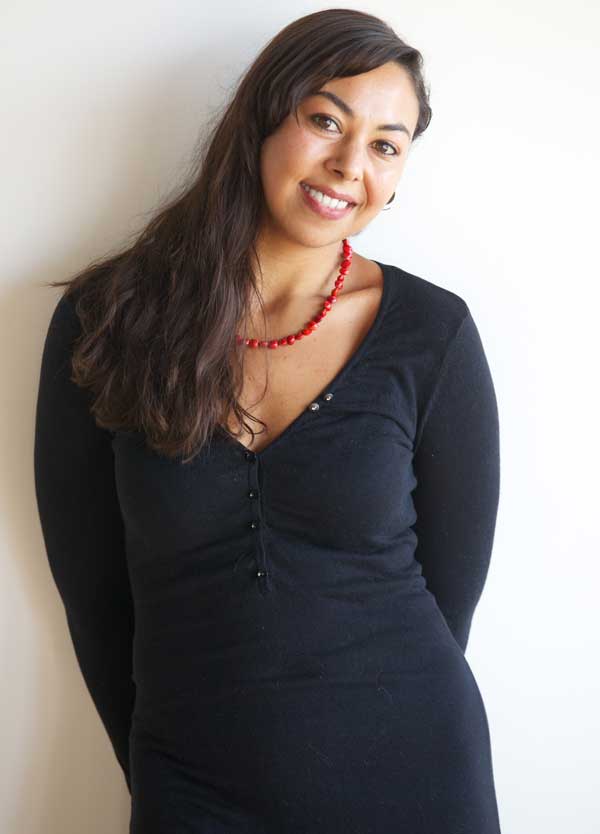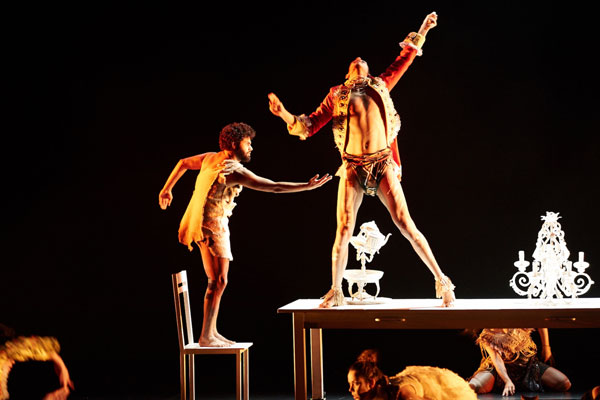There’s no denying that when it comes to Australian history, the stories we are taught in school really only relate to or focus on the period post-colonisation (or more appropriately, post-invasion).
As part of the Bangarra Dance Theatre’s latest production, ‘OUR land people stories’, dancer, Jasmin Sheppard, will perform her self-choreographed performance ‘Macq’ which interprets the story of the 1816 Appin Massacre involving the Dharawal people and the then New South Wales Governor, Lachlan Macquarie.
As with many events from that time, very little is known about the experiences of the indigenous people by the broader population and it is through the ‘OUR land people stories’ performances that Jasmin and her fellow dancers hope to raise more awareness and to educate audiences both at home and abroad.
 Jasmin Sheppard - Image © Greg Barrett
Jasmin Sheppard - Image © Greg BarrettFirstly, how did you be celebrate NAIDOC week?
NAIDOC is special, but I celebrate my indigenous heritage every day, and I think Australia should too. Our beloved artistic director, Stephen, has been awarded the lifetime achievement award, so we all celebrated that.
Tell me a bit about 'OUR land people stories' - how did the production come together?
Stephen was eager to give my work ‘Macq’ a life in a main stage season, and he had also nurtured a creative partnership between Daniel and Beau, which has culminated in their work Miyagan. Stephen had wanted to do a work on visual artist Nyapanyapa for some time, so it seemed like the right time for these works to come together as a triple bill.
{youtube}v=lApff6XgT6c{/youtube}
You choreographed 'Macq', tell me about the story behind that and why you felt a connection to telling that story (the 1816 March of Macquarie)?
I created ‘Macq’ in 2013 as part of a small company work held at our Bangarra studios. ‘Macq’ is an investigation into the governance of Lachlan Macquarie in the early 1800s in Sydney colony, and the impact and influence he had on the Aboriginal people at that time. I am particularly looking at his relationships with Aboriginal people, specifically the Dh’arawal people of south west Sydney, which ultimately ended in a massacre at Appin that devastated the community. I felt a great urge to tell this side of history the more I discovered that it was seldom taught in schools and few Sydney siders knew of this massacre.
What does it mean to you as an indigenous Australian to be able to tell your stories, both in Australia and abroad?
It means a great deal to me to be able to give a voice to the untold stories. To be able to expose the truth of our history that is at times uncomfortable. The work we do at Bangarra is akin to a contemporary form of traditional culture. We pass on stories and events through dance. We educate and share the oldest continuing culture on the planet. The sad thing I’ve often found is that our audiences abroad tend to have a deeper understanding, respect and knowledge of Australia’s indigenous peoples than our audiences here.
When did you first start dancing? What is it about the art of dance that you love?
I started dance quite late, at around 15, doing casual classes in ballet and contemporary at a school on the Mornington peninsula where I grew up. I love dance because it is a raw honest expression of spirit, it is also a very tough form of athleticism, and it communicates to audience members deeply without the use of words.
What is it like being a performer for Bangarra?
Dancing with Bangarra is my dream job. We have a bond that goes deeper than just our love of dance, we also share our cultural heritage. Some of us are even related!
You have a rich cultural heritage - how do you relate/identify with your heritage and do you feel more connected to one more than the other? How do you tell your story regarding your identity?
I think I feel more connected with my Irish and Aboriginal ancestry, purely because I grew up in Australia, surrounded by my Aboriginal mob, but also being raised by my Irish great grandmother and grandmother who were very traditional in a lot of ways. My grandfather on my mother’s side was a Russian Jew who grew up in New York City, so if I had been raised there I may have been more connected to the Russian Jewish community in New York. I think every aspect of my cultural heritage has influenced me in some way, and different parts will play different roles in different parts of my life.
What are you most excited about for the national tour of 'OUR land people stories'?
I’m excited to re-write the history pages with ‘Macq’, and to inspire audience members to question the history of this country they’ve been taught. Also every year is exciting as a dancer when we head out on tour with a new show to share.
'OUR land people stories' plays at the Playhouse Theatre, QPAC 12-20 August.

